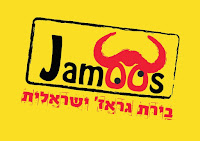Lucky is the person who lives near a home-brewer. If you play your cards right, you shall not lack for good beer.
Jerusalem's Givat Hamivtar neighborhood, near Ramat Eshkol, has a few such lucky people. They live near Yair Uziel and Ron Prigat, two 27-year-old home-brewers who love to share their beer with friendly neighbors who appreciate it. And once a year, sometimes more, Yair and Ron throw their famous Brewgarden party for family and friends. I was fortunate to be invited to number six a few weeks ago.
 |
| Ron Prigat (left) and Yair Uziel pumping their home-brews at the sixth Brewgarden in Jerusalem. |
The Prigat family garden is an ideal backdrop for a brew party, with grass, flowers and shade trees to set the scene. Yair, who works in high-tech, and Ron, an artist, were in their element, pumping beer from a homemade refrigerated tap system while offering their guests inspired explanations.
They were selling four kinds of beers that day, all solid styles.
Honey Wheat (4.5% ABV) -- Classic weissbier color and aroma, but the honey is very dominant to the taste. It contrasts well with the sourness in the beer, so I guess it could be called sweet-and-sour. Quite yummy, actually.
Belgian Trippel (8.5%) -- Another classic: Strong alcohol scent. Taste of sweet malt and yeast cake. Very weak hops.
Coffee Stout (4.5%) -- Made with Brazilian coffee, this has a delicious strong coffee taste, though the body is weak for a stout. I had the feeling that a good spot of milk or cream would have been just right.
Rye IPA (7%) -- This was the only "non-classic" beer being served. About 5% of the grain used is unmalted rye. The beer is not as bitter as a regular IPA, perhaps because the rye imparts a fruity-nut flavor. The hops, however, are very present, both in aroma and taste. A very drinkable IPA -- avoiding extremes while keeping taste.
Ron and Yair have been making beer for about three years, brewing batches of 150 liters each time.
"Our Beergardens have become public events," says Ron, "attracting people from all over. We get to share our beer with other people and get their feedback. It shows that our brewing has meaning, that we're not just another small home-brewery."
I have found that many home-brewers have this need to reach out, to share their beer with others. They may even go to the extent of giving their beer a brand name, a logo and a label -- even though they have no intention of going commercial. It's as if their beer brewing is not just a generic hobby, but needs to have a name and a personality of its own.
In the case of Ron and Yair, they call themselves the Yeasty Boys, but still do not have a brand name for their brewery. There's already a Yeastie Boys Brewery somewhere in New Zealand, so they don't want to go with that.
They'd be happy to hear suggestions from readers, so if you have any bright ideas, please send them to me.
At any rate, take a tip from me and search your neighborhood for home-brewers. If you find any, introduce yourself. They'll probably be very friendly people, as home-brewers usually are. Tell them how much you appreciate good craft beer. You're sure to make a new friend -- and you shall not lack for good beer.
 |
| Ron Prigat sharing secrets with the old blogger. |
Belgian Trippel (8.5%) -- Another classic: Strong alcohol scent. Taste of sweet malt and yeast cake. Very weak hops.
Coffee Stout (4.5%) -- Made with Brazilian coffee, this has a delicious strong coffee taste, though the body is weak for a stout. I had the feeling that a good spot of milk or cream would have been just right.
Rye IPA (7%) -- This was the only "non-classic" beer being served. About 5% of the grain used is unmalted rye. The beer is not as bitter as a regular IPA, perhaps because the rye imparts a fruity-nut flavor. The hops, however, are very present, both in aroma and taste. A very drinkable IPA -- avoiding extremes while keeping taste.
Ron and Yair have been making beer for about three years, brewing batches of 150 liters each time.
 |
| Beer and company at the Brewgarden. |
I have found that many home-brewers have this need to reach out, to share their beer with others. They may even go to the extent of giving their beer a brand name, a logo and a label -- even though they have no intention of going commercial. It's as if their beer brewing is not just a generic hobby, but needs to have a name and a personality of its own.
In the case of Ron and Yair, they call themselves the Yeasty Boys, but still do not have a brand name for their brewery. There's already a Yeastie Boys Brewery somewhere in New Zealand, so they don't want to go with that.
They'd be happy to hear suggestions from readers, so if you have any bright ideas, please send them to me.
At any rate, take a tip from me and search your neighborhood for home-brewers. If you find any, introduce yourself. They'll probably be very friendly people, as home-brewers usually are. Tell them how much you appreciate good craft beer. You're sure to make a new friend -- and you shall not lack for good beer.






















































































